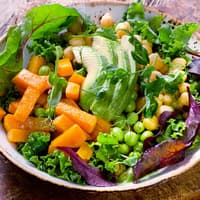
So how does healthy eating and losing weight work? Here you can read about the misconceptions you should know and avoid in order to become permanently slim:
1. smoothies are slimming foods.
The devil is in the detail here: a smoothie for breakfast is a good idea, but a smoothie as a snack is not. There is significantly more fruit in a glass than you would normally manage to eat whole. That's why a smoothie contains a lot of vitamins, but also a lot of fruit sugar in concentrated form. Think of smoothies as meals, not drinks.
2 I can train away problem areas.
It seems quite simple - for a flat, defined stomach I have to do lots of sit-ups. Unfortunately, the reality is different. Where the body prefers to store fat has something to do with predisposition and can hardly be influenced. Targeted training of individual muscle groups can build up muscle mass, but the decisive factor for a flat stomach or smaller bottom is reducing the overall body fat percentage.
3. as a vegetarian, I lose weight more easily.
Sounds logical: fruit and healthy greens, no fatty meat, no sausage. The pounds will fall off by themselves. But this calculation doesn't automatically add up, because fatty cheese, pasta, white bread, cakes, potato chips and cookies are also vegetarian - and anything but figure-friendly. It is true that you can lose weight with a calorie-conscious vegetarian diet. But it also works wonderfully with lean meat and fish.
4 I don't eat potatoes, they make me fat.
Acquittal! Yes, they contain 15 to 17 g of carbohydrates per 100 g. But they also contain almost no fat, only around 70 kcal and therefore good fiber and valuable vegetable protein. Potatoes also have an alkalizing effect, which relieves the metabolism and paves the way for losing weight. So: if carbohydrates, then potatoes please.
5 Weighing yourself once a week is completely sufficient.
Daily, once a week or preferably only once a month? A study sheds light on the controversial debate about how often people who want to lose weight should weigh themselves: People who weighed themselves frequently, i.e. at least every two days, were more successful in losing weight in several comparative studies and were better able to maintain their weight in the long term. It is also important to set yourself a precise weight target.
6. muesli is a super healthy breakfast
Hands off! Ready-made muesli is a nasty fattening food. Simple carbohydrates from nutrient-poor cornflakes, raisins, chocolate and added sugar provide empty calories. It's better to mix your own muesli from good ingredients.
7 Carbohydrates know no time.
This may be true, but our metabolism does know what time it is. It ticks to the biorhythm and needs certain nutrients at certain times of the day in order to run at full speed. And so it remains the case that carbohydrates in the evening block the burning of fat at night and thus slow down weight loss.
8 Healthy snacks help you lose weight.
It all depends. Fruit is healthy and is often eaten as a snack. But because of the high fructose content, the blood sugar level gets out of balance and fat burning is interrupted. Prevent cravings by drinking plenty of fluids and keep these healthy low-carb snacks to hand for emergencies: Cucumber, radishes, a hard-boiled egg, bell peppers, tomatoes, sliced poultry or cottage cheese.
9 I just need to do more sport again.
43 percent of Germans are convinced that exercise can replace a diet. Unfortunately, this is wrong. A simple example: To lose a single chocolate bar, you would have to jog for half an hour. Approximately 70 percent of weight loss success depends on diet. Sport is "only" a useful supplement, but not a substitute for a diet plan in which you take in less energy than you consume over a longer period of time.
10. regular detoxification is important.
The myth of waste products persists. The assumption is that metabolic residues that arise during digestion are deposited in the body as waste products, just like in a stovepipe, and must be regularly flushed out through drinking cures. All nonsense, the body cleanses itself via the kidneys and intestines. The DGE states that the term "detoxification" cannot be scientifically substantiated.
11 Special pineapple enzymes make you slim.
Another persistent myth. The enzyme bromelain from pineapple is said to break down proteins and stimulate the metabolism. However, no study has yet been able to prove a connection.
12. sauna sessions melt fat.
Why else would there be scales in every sauna if not to document weight loss? It would be nice. The rapid weight loss has nothing to do with melted fat deposits, but indicates the loss of water through sweating. The skin is still happy about the sauna and looks firmer and more radiant.
13 The less I eat, the faster the pounds tumble off.
The scales may prove you right for the first five to seven days. After that, our body's emergency program kicks in and tells us to "slow down metabolism, save energy". This is why crash diets are always followed by the yo-yo effect. In the long term, losing weight becomes even more difficult because the body remembers the emergency situation and protects its reserves.
14 Fat makes you fat.
That's what 45 percent of Germans think, although it's not true. Too much of the wrong fat leads to obesity. Essential fatty acids, on the other hand, should cover at least five percent of the daily energy requirement so that the metabolism can work smoothly.
15 The main thing is to get the calorie balance right.
Almost one in two people believe that it is enough to simply eat less and not exceed a certain amount of energy, e.g. 1,200 calories per day. Nutrition experts warn that this is too simplistic. Without a plan, deficiency symptoms can occur and if important nutrients are missing, fat burning will not run smoothly.






